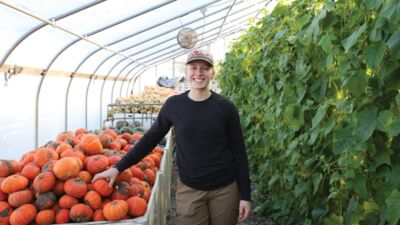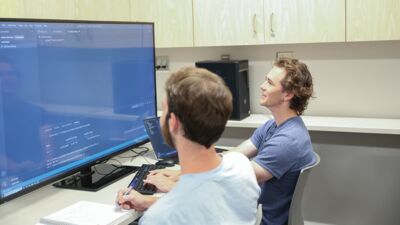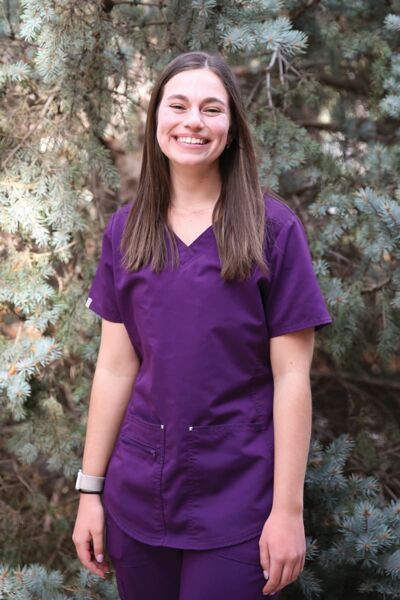
To Joyfully Serve
Story: Brook Lange '24
Photos: Liz Kucera and Hope Rickords ’21
Concordia students serve their communities through internships and careers even before graduation.
Between internship requirements, summers off and attempting to find a stable income before graduation, working during college becomes pretty standard practice for college seniors. Often, the purpose of these jobs can seem inherently self-centered--they are either resume boosters, working for a cool-sounding title or company in exchange for not that much pay, or working for a company that isn’t in your career field purely for the purpose of making money. In either case, having a job as a senior in college can feel like a necessary evil, to either pay the bills or boost the resume or, if you’re lucky, both.
In order to get through this potentially dull phase of work, it can be helpful to reframe the idea of what work should be about. That change starts with realizing that “work” is not just about the jobs we have, work is about what motivates us to do the jobs we have. This means that the work we do has to come from a starting place of ideals. At Concordia University, Nebraska, these ideals that motivate people to do the work they do often stem from the word “vocation.”
We don’t choose our vocations; God chooses us for them. Everything we do, from our jobs to our relationships to being good citizens in our community are charged with the presence of God.
Students at Concordia get a sense of what vocation is through required Faith and Life classes. Rev. Dr. John Genter, professor of theology, philosophy and biblical languages, makes vocation an important focus in his Faith and Life Class. Genter makes the clarification that vocation is not just an idea, it is something that students and all people can live out every day. Genter states, “When people hear ‘calling from God,’ they may begin to think of church-related areas of ministry. Pastors, Christian teachers, deaconesses, DCEs, church musicians and so forth certainly have callings from God. But so do parents raising children, accountants keeping accurate books and farmers providing the world with food.”
Recently, I had a few opportunities to talk to students who are living out their vocations as students who are working part time while attending school.
Ami Pritchett Farm Hand
Ami Pritchett ’24 finds great joy in her work as a farm hand. "I love being outside and working with my hands. Although the work itself can be very exhausting, it’s a joy to be able to serve others and provide for them in this way."
Pritchett works at the farm Tuesdays, Thursdays and Fridays. A typical day for her looks like weeding, sorting the produce and delivering it.
Even though working on the farm is a unique experience, Pritchett feels that her penchant for doing her work well and serving those around her is something she will be able to do wherever she goes. "Every farm has a slightly different culture and set of values,” she said. “Regardless of that, no matter where you are, God’s going to give you opportunities to advance the kingdom to serve the people around you. In my job, there’s lots of opportunities to be an example. No matter where I am or what I’m doing, I try to stay calm and positive to serve the other people around me.”

Andrew Brandt Software Development Intern
Andrew Brandt ’24, a senior computer science major currently working part time as a software development intern at Sandhills Global, is trying to navigate doing his work well, while simultaneously feeling like a novice. He initially applied for this internship for the opportunities to learn, but a lot of what he is learning is how to ask for help.
Brandt comments that this is not uncommon. “Software development is a very collaborative process,” said Brandt. “Most of my time is spent building off things that other people have already created, rather than starting something new.”
Because of this collaborative nature, Brandt currently spends a lot of time figuring out problems with help from his coworkers. “Usually, I start working on a project, and I have to find who in the company has worked with this software, so they can help me figure it out. You really have to learn to balance between asking for help and working through it yourself.”
Though Brandt feels that his work does not always look like serving others in a traditional sense--for example, his work a few weeks ago entailed comparing tractor prices and finding how best to sell them--he sees the opportunities to serve others around him within the field that he works. “The most fulfilling thing about my work is that a few weeks ago I didn’t know how to do something, and now I know how to do it. It is the process of learning that is really fulfilling.”
Brandt is putting in the work so he eventually can do just that. “I really want to get to the point where people can eventually ask me for help. That is part of the reason why I’m willing to work through these things.”

Jenna Potratz Certified Nursing Assistant
Jenna Potratz ’24, senior biology major, also lives this out frequently in her work.
Potratz is currently working part time as a Certified Nursing Assistant at Ridgewood Rehab & Care center. On a practical level, she chose to do the job because it fulfilled an internship requirement. Her daily tasks in her job have the potential to look relatively mundane. She is regularly tasked with walking people to dinner and helping them go to the bathroom. But there is a large portion of the work that requires a lot of patience.
“Throughout my time, I’ve learned people skills more than anything,” Potratz said. “You really have to be patient and have a lot of empathy for people, regardless of where they are mentally. For example, if a resident thinks that their room is on fire, it might seem a little silly at first, but you’re not going to get anywhere if you don’t try to see things from their perspective. If my room was on fire, I would be freaking out. What we think is sometimes ridiculous is their absolute reality.”
Potratz also puts in effort to go the extra mile for residents. “I really try to care for people, even when I get frustrated. I know that I would want someone to do the same for me.”
This selfless care is a very important aspect of vocation. “It is in our God-given callings as family members, neighbors, workers, congregants and citizens that we live out our faith, bear our crosses and joyfully serve those whom God has put in our life’s path,” said Genter. “Experiencing life through the lens of Christian vocation reminds us that, no matter how seemingly inglorious the task, it is all service to our Lord Jesus Christ who hides himself in our neighbor.”
So even when the work feels confusing, or like it doesn’t matter, we can remember who we are working for. God is present in every part of our lives, including in the mundane tasks we are assigned at work, when we deal with difficult coworkers or when our email inbox is full. We always have the opportunity to serve others through that work. That is an incredible gift.